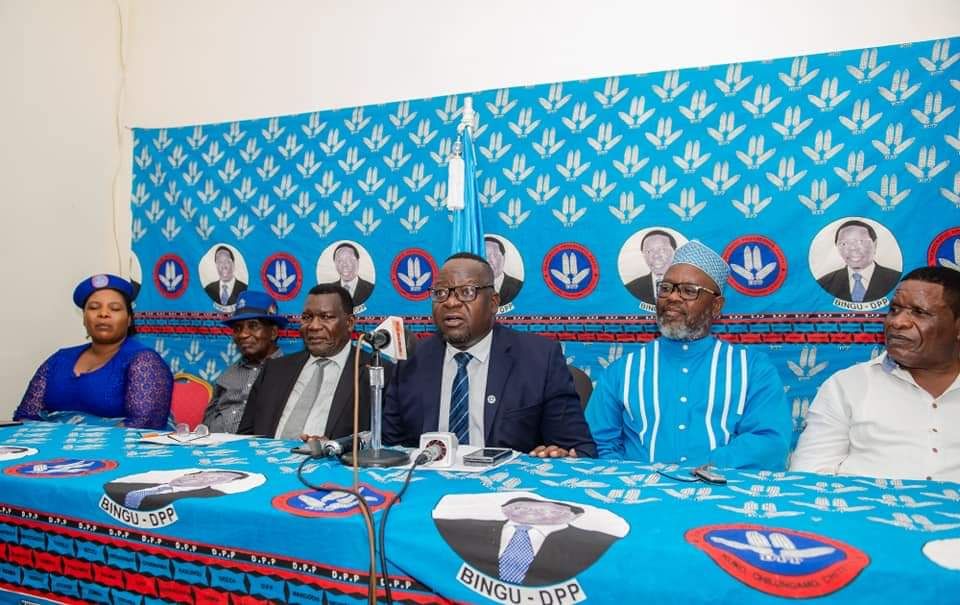By Burnett Munthali
The Democratic Progressive Party (DPP) is no longer obligated by any courts in the country to conduct an elective convention, as ruled by Judge Simeon Mdeza of the High Court registry in Lilongwe on Friday 12, 2024. This implies that the DPP is now at liberty to hold an elective convention at any time it deems fit without any implications of contempt of court. Volume 9 at paragraph 52. Paragraph 52 states that it is a civil contempt of Court to refuse or neglect to do an act required by a judgment or order of the Court within the time specified in the judgment or order, or, to disobey a judgment or order requiring a person to abstain from doing a specified act.

Judge Mdeza issued an order suspending the enforcement of his judgement made on September 29, 2023, and consequently, the order to hold a convention as determined by the courts has been suspended. Suspended judgment is a cognitive process and a rational state of mind in which one withholds judgments, particularly on the drawing of moral or ethical conclusions. The opposite of suspension of judgment is premature judgement, usually shortened to prejudice. While prejudgment involves drawing a conclusion or making a judgment before having the information relevant to such a judgment, suspension of judgment involves waiting for all the facts before making a decision.
By suspending the September 29, 2023 judgement, it simply means that Judge Mdeza’s judgement has been cancelled. In other words, the point at which things are today is the same as if the said judgement was not made and never existed before. To ask a court to set aside (cancel) a court order or judgment, you have to file a “request for order to set aside,” sometimes called a “motion to set aside” or “motion to vacate.” The terms “set aside” or “vacate” a court order basically mean to “cancel” or undo that order to start over on a particular issue.
Lawyer Cassius Chidothe, who was absent from court, states that he acted in accordance with the instructions from his clients, indicating that the claimants are no longer interested in further litigation. Civil litigation can be broken into three main phases: pre-trial, trial, and post-trial. Each of these phases has certain tasks that must be completed in order to protect the rights of everyone involved in the lawsuit.
I have always argued that political parties must not be controlled by any courts in the country to conduct an elective convention. It’s it’s therefore interesting to now that the recent judgement ruled by Judge Simeon Mdeza of the High Court registry in Lilongwe on Friday 12 January 2024 says exactly just that. Delegates go to the national convention to vote to confirm their choice of candidates. But if no candidate gets the majority of a party’s delegates during the primaries and caucuses, convention delegates choose the nominee. This happens through additional rounds of voting.
A constitution is important because it ensures that those who make decisions on behalf of the public fairly represent public opinion. It also sets out the ways in which those who exercise power may be held accountable to the people they serve. You must submit your party’s constitution as part of your application to register a political party. Citizens seriously want a united opposition as elections are fast approaching just as they would also like to see a government of their choice which can deliver. A serious political battle is anticipated between Democratic Progressive Party and Malawi Congress Party as the two major heavy weights which command the largest following.
Political parties must have a written constitution that sets out the structure and organisation of their party. This sets out the arrangements for their party’s governance and the rules for carrying out their business. The constitution must show that the party can comply with the Political Parties, Elections and Referendums – nothing in it should contradict legal requirements. It is therefore exciting to note that that at the very end of long and boring legal battles in the opposition DPP, the Malawi judiciary finally ruled a case in which some members were advised to respect their own party constitutions and structures in order to solve their political opinions and differences.
*_Malawi Political Parties_* *_(Registration and Regulation) Act_*
_*5. Application for registration*_
_(2) An application for registration shall be signed by the office bearers of the political party and shall_
—
_(a) specify the name of the party; and_
_(b) be accompanied by—_
_(i) two copies of the constitution, rules and manifesto of the party, duly certified by the leader of the party;_
_(ii) the particulars of the registered office of the party;_
_(iii) a list giving the names and addresses of the leader and other office bearers of the party;_


